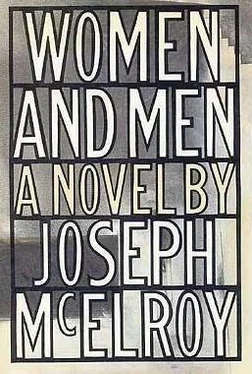But when the blood went down and he gulped and he heard his lips smack a little as he opened his mouth and closed it, he was in the wind like the tatters of plastic wrap caught and streaming in the trees up Park Avenue, wreckage of things not said though chased right up to the skin of these things by what on the other hand had been said—"You said I should take a job but it’s not easy when the children are getting home at three, three-thirty in the afternoon." "Three-forty-five." "And you thought you were thinking up ways to pass my time." "That’s how I passed my time flying home from the motor capital of America." "Is that all?" "Wasn’t I right for the wrong reason at least?" "Pay attention, man, don’t you understand — you’re never right—" " — or am I ever right?" "You sound like my father." "I don’t complain like he did." "You’ve only heard me say so, Jim." "You made me feel like I was there." "You gripe about your father." "So do you about my father." "I hardly know your father." "O.K., then, neither do I know him." "At least I take the children out to see him, Jim." "Not always by yourself." "Once with Lucille." "Once?" "Another time, too." "Then twice." "And I will again." "With Lucille?" "I will again."
Did he draw blood? No, the blood he tasted rose to her scissors drawn by her. But tasting it he knew what she was thinking. He felt it in his throat, drying. That all he and she had been doing was having him a haircut. Well, the void from her point of view of his was the void between them out of which he had found elbow room to pluck a story to smooth things over. Oh but in those days (he’d say), in those days (speaking to Andrew or Flick who liked such stories less — or Joy) in those days when the great tribal roads were strung out like pavement with silver dust and people in certain quarters of the world had ways of disappearing into next month — in those days, he’d say, speaking of the monster in the form of a pyramid that came traveling up out of the south from Mexico propelled by a barrel revolving or below to trap the Inventor of New York while he was dickering with the Manchoor Princess, the Anasazi healer, and the ill-fated wanderer-scientist the Navajo son called by the Princess "Prince," dickering not (if possible) about the giant bird’s steep rise in horse consumption, but about the treaty agreed on (in principle) setting up the Four Worlds Adjacent which discovered in the Creation’s Four Corners meeting back to back and looking outward a new weather we make ourselves so as to have something in front of us (is that it? fit it in); in "those" days, he would say, but then couldn’t help thinking also of right now, the children growing, his job developing, his wife deciding not to go back after all into the lighting-design business — get a degree, a degree — and think that now was "those days" too.
"Can I see?" he said to her.
She showed him her hand and there was nothing, no blood.
In that future, then, they’d do it together, give up.
That is, split.
Compared to their parents, this was progress.
But oh Christ he knew her! It would have to be exactly mutual, the relenting; and like long-distance phone receivers coming down at the end of a call, it would have to be at the same time.
Was that due to suspicion? Was it stubbornness? United we fall.
He loved her young face. Her father had looked young up to and beyond his death. But she looked at you as if there were something in you that was beyond you. She got like Lucille Silver sometimes and would look at him so he felt elsewhere or like falling apart, scrambled, and she’d musingly say, "I don’t think you care about your work enough — isn’t that crazy? — the thought came to me — it doesn’t make sense, I mean with all the time you’re away doing it — but the thought came to me from you."
Like their daughter Flick, Joy remembered every damn thing he said, or he felt she did, and sometimes more than he, and she knew he had an idea of what it was like to be her — as if the story or thing he’d said that she recalled more of than he had been delivered by him to her sealed — and she remembered not just stories told more than once. She told Flick about Spence and his cemetery story. And the man who sabotaged a wire-service plot at the Lindbergh trial: the plot pretty tacky for these later days of free-lance electronic technicians traveling the AP circuits, old stuff compared to days of video monitor screens that AP bureau staff watch hour by hour; but still a pretty advanced plot for the thirties — to scoop the Lindbergh verdict. And this man, this saboteur of spies, who knew nothing of the lady handwriting expert who, instead of being allowed by the defense to testify, hid out with a farmer for she was afraid for her life, knew the men who were to be secretly stationed up in the old wooden bell tower: for there they were waiting to get word from their own man in the shirt-sleeve-sweltering courtroom below who was the only one in the courtroom wearing an overcoat, he was hiding a transmitter — but the men in the bell tower, poking a head up now and then you can be sure, got along so well with each other that they reached a state beyond mere news — and by the time the jury came back in, the men in the tower were so well along snorting and recollecting other times quietly guffawing that they got the code wrong from the man in the courtroom and in their turn signaled from the bell tower to their relay at an outside phone that the guilty verdict included a mercy recommendation (which it did not) and this news hit the headlines first.
But for heaven’s sake, Lucille’s musical, witty, calm voice of the Now future says, What’s so great about the Lindbergh case, I don’t even like him, what’s so great anyway? I know he was a hero flying the Atlantic all by himself — it was a chance to be alone! — but why did the kidnap sell so big? you can find more awful things to sell than that.
It was an immigrant stealing an heir, said Joy.
Mayn’s own words, pretty near. For he had said — more than once, he saw—"An illegal immigrant appropriating an American hero’s son."
But Joy hadn’t picked up that that answer didn’t satisfy him. He was too dumb to do better, even the ransom notes had been written by someone other than Hauptmann. And he saw that his words coming from Joy had come from him and not just previously but right now (and off balance because of Lucille) — as if he’d said them now instead of quite a while ago.
Listen, said Lucille, that case was a sensation before they arrested Hauptmann.
Newsprint can make anything a sensation, Lucille.
That’s my name all right, Jim, but if you want to get personal, do it right. The papers don’t pick up just anything. They had a direct line to the family mind.
It was a two-way flow and it was all one mind, Lucille.
But what did it?
Lindbergh made history.
History made Lindbergh.
No, Lindy made history; newspapers report it; a daily paper is like a molecule of history — how’s that?
Not good, said Lucille.
Not bad, said Joy.
She was looking at Jim the way Lucille did, with that precise, clear, yet tediously sexual attention that was like sympathy yet maybe meant to make him need something less good. Need something less good? (He couldn’t say it or feel it better than that, he surrendered to a nation not himself, voices that passed through him. They wanted him to weaken, to say dumb things. Did he hate them?
Wait — hold on — did he hate anyone? Displaced at left halfback by the Indian Ira Lee, he’d taken over fullback in the single-wing days of Texas A&M’s line-bucking Kimbrough.) And he said in answer to Lucille, even to Joy: Oh the big deal was wealth and safety, wealth’s safety, the safety of safety — oh (he said, feeling as free as not knowing what came next) safety in a country house with the cash stacked up in the basement with a flag tucked in around it, but — (he ran out of freedom). .
Читать дальше












